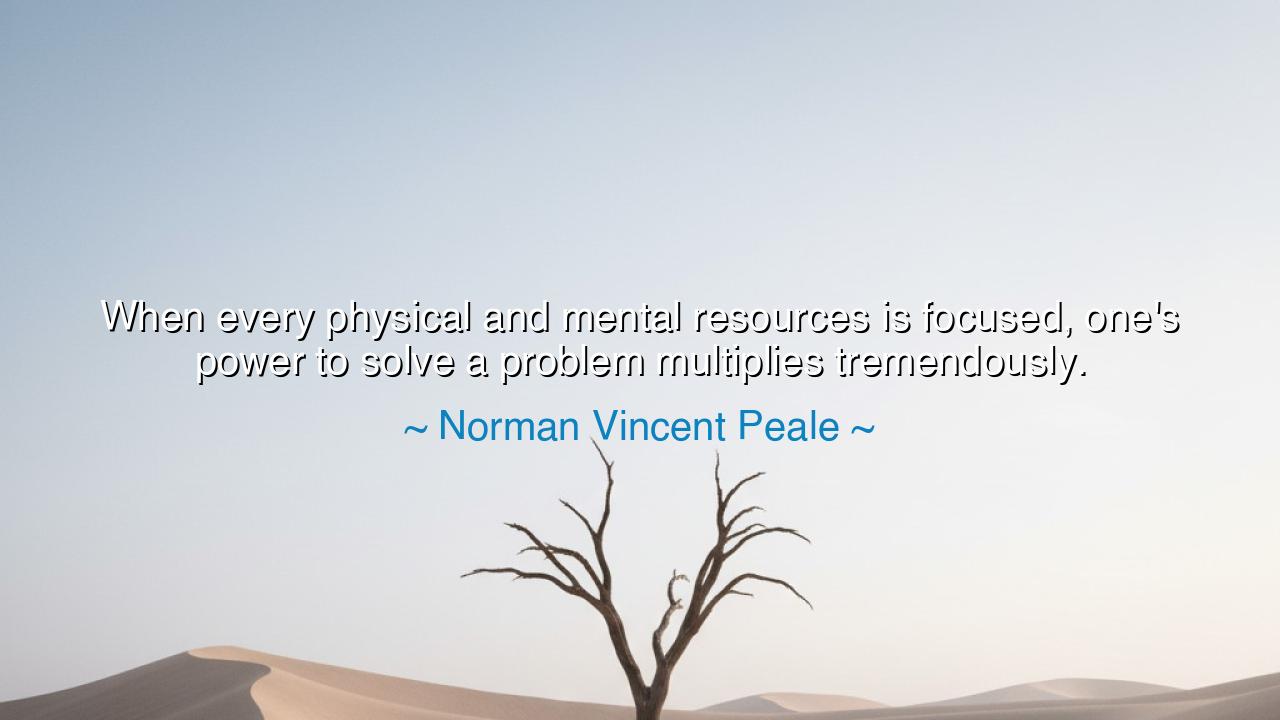
When every physical and mental resources is focused, one's power
When every physical and mental resources is focused, one's power to solve a problem multiplies tremendously.






Hearken, O children of diligence, to the enduring counsel of Norman Vincent Peale, who illumines the path of human achievement through the power of focus. He teaches that when every physical and mental resource is directed toward a single purpose, the capacity to solve a problem is not merely additive, but multiplies with extraordinary force. Here lies a truth for the ages: concentrated effort, guided by clarity and will, unlocks powers within the soul that scattered attention cannot summon.
The origin of this reflection is rooted in Peale’s life as a minister, author, and teacher of positive thought in the twentieth century. He observed that ordinary men and women, when disciplined and intentional, could achieve feats that seemed impossible. In his works, he emphasized the cultivation of mental focus, faith, and purposeful action, urging all to harness their energies fully, rather than dissipating them in indecision or distraction.
The meaning of this aphorism resonates across the spheres of human endeavor. To bring every resource—mind, body, and spirit—into alignment is to awaken a force capable of surmounting great obstacles. When focus is achieved, the mind perceives solutions previously hidden, creativity flourishes, and the courage to act is fortified. Peale reminds us that concentration is not mere effort, but the channeling of potential into tangible results.
History offers vivid examples of this principle. Consider Thomas Edison, who devoted himself tirelessly to the invention of the electric light. Every thought, experiment, and effort was directed with singular purpose, until finally, after countless trials, he achieved success. The alignment of his physical and mental resources exemplifies Peale’s truth: focused endeavor multiplies the power of the individual, turning persistence into triumph and vision into reality.
Moreover, this teaching extends beyond invention into the struggles of everyday life. The student who concentrates wholly upon study, the healer who dedicates body and mind to the care of the sick, and the leader who marshals all faculties toward justice all manifest the multiplication of power Peale describes. Through focus, obstacles that once seemed insurmountable are rendered tractable, and the human spirit discovers its latent strength.
O generations yet unborn, take this counsel into your hearts: gather your mental and physical resources, direct them with clarity, and let your energies converge upon the task at hand. In this union of purpose, the impossible becomes achievable, wisdom and creativity are magnified, and the power to solve problems rises to heights previously unimagined. Let your focus be your sword, your resolve your shield, and your concentrated effort the instrument of enduring achievement.






NDAnh thu Nguyen do
This statement prompts me to consider the broader implications for teamwork and collective problem-solving. Can a group achieve similar multiplication of power if everyone’s physical and mental resources are aligned and focused on a shared goal? I also wonder about the difference between deliberate practice versus spontaneous insight—does concentrated effort always lead to better solutions, or are there scenarios where stepping back and allowing for mental flexibility produces superior results?
TPTUOI PHAN
Reading this, I’m intrigued by the connection between mind, body, and problem-solving capacity. Does physical preparedness—like rest, nutrition, and exercise—play as critical a role as mental focus in achieving peak performance? How do people train themselves to fully harness all resources simultaneously, and what practices or routines maximize efficiency? It also makes me reflect on personal experiences where a high level of focus produced breakthroughs that seemed impossible under ordinary circumstances.
HTHoang Thao
I find this perspective inspiring but also challenging. Does multiplying problem-solving power through focus suggest that effort and discipline can outweigh raw talent? I’m curious about the limits of this idea: is there a point where over-focusing leads to stress or burnout instead of increased effectiveness? It also raises questions about how to structure work or study environments to encourage sustained concentration, and whether technology helps or hinders this process.
ATle anh tung
This makes me think about the concept of focus as a multiplier of human potential. How realistic is it to achieve total concentration in today’s world filled with distractions? I also wonder whether this principle applies equally to all kinds of problems—do creative challenges benefit more from focused energy than analytical ones, or vice versa? Additionally, what strategies can individuals adopt to maintain such a high level of mental and physical alignment consistently over time?